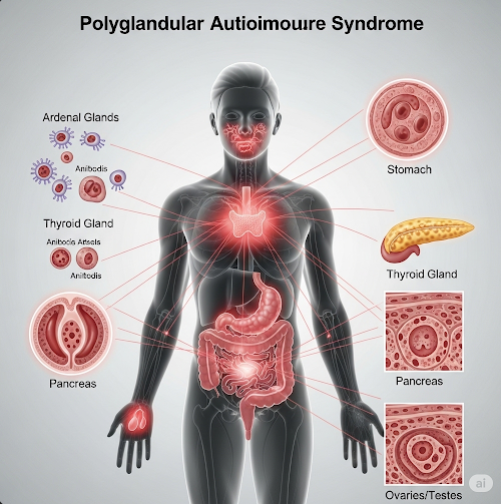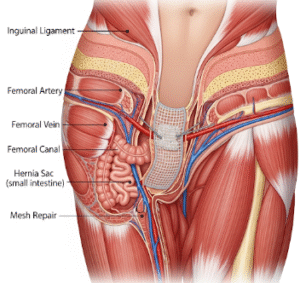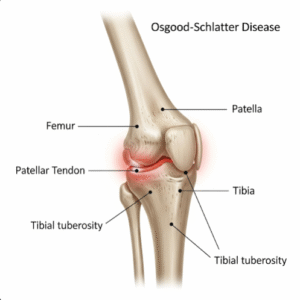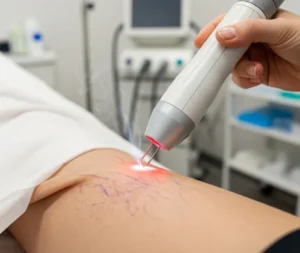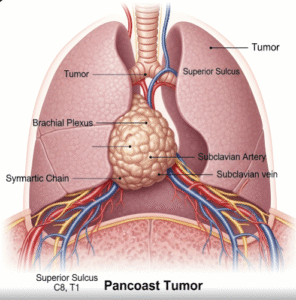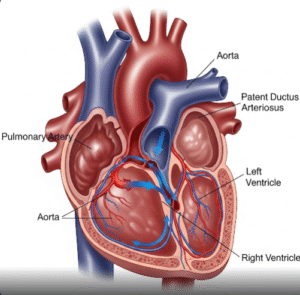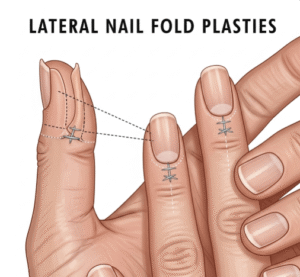Overview
Polyglandular Autoimmune Syndrome (PAS), also known as Autoimmune Polyendocrine Syndrome (APS), is a group of rare disorders in which the immune system attacks multiple endocrine glands, leading to hormonal imbalances and glandular failure. The condition can affect the thyroid, adrenal glands, pancreas, parathyroid glands, and more, and may also involve non-endocrine organs like the skin or intestines. PAS is chronic and progressive, requiring lifelong monitoring and treatment.
What is Polyglandular Autoimmune Syndrome?
PAS is a type of autoimmune polyendocrinopathy, meaning it involves multiple glandular organs being attacked by the immune system. This results in the inability of affected glands to produce essential hormones, causing a range of systemic symptoms. PAS is classified into three main types:
- Type 1 (APS-1):
- Typically begins in childhood
- Caused by mutations in the AIRE gene
- Inherited in an autosomal recessive pattern
- Type 2 (APS-2):
- Most common form
- Occurs in adults, usually between 20–40 years
- Associated with Addison’s disease, autoimmune thyroid disease, and type 1 diabetes
- Complex, polygenic inheritance
- Type 3 (APS-3):
- Features autoimmune thyroid disease without adrenal involvement
- Often includes type 1 diabetes, pernicious anemia, or vitiligo
Symptoms
Symptoms vary depending on which glands are affected and the severity of hormonal imbalances. Common symptoms include:
- Fatigue and weakness
- Weight loss or gain
- Low blood pressure or dizziness
- Darkening of the skin (Addison’s disease)
- Cold intolerance (hypothyroidism)
- Excessive thirst and urination (type 1 diabetes)
- Menstrual irregularities or infertility
- Muscle cramps or spasms (due to low calcium)
- Hair loss or skin pigmentation changes
- Digestive issues (malabsorption, diarrhea)
Each patient may have a unique combination of symptoms based on which glands are involved.
Causes
PAS is caused by autoimmune destruction of endocrine tissues. The immune system mistakenly identifies the body’s own cells as threats and creates antibodies against them. Causes vary by type:
- PAS Type 1:
- Caused by mutations in the AIRE gene, affecting immune tolerance
- Leads to multi-organ autoimmunity from early life
- PAS Type 2 & 3:
- Caused by a combination of genetic susceptibility and environmental triggers
- Strongly associated with HLA genes and family history of autoimmunity
Environmental factors such as infections, stress, or toxins may also play a role in triggering symptoms.
Risk Factors
Risk factors for developing PAS include:
- Family history of autoimmune diseases
- Certain HLA gene types (e.g., HLA-DR3, HLA-DR4)
- Female gender (higher prevalence)
- Having one autoimmune endocrine disorder (e.g., thyroid disease or type 1 diabetes)
- Genetic mutations (in APS-1)
Complications
If left untreated, PAS can lead to life-threatening hormonal deficiencies and organ failure, including:
- Adrenal crisis (sudden drop in cortisol levels)
- Severe hypoglycemia or hyperglycemia
- Heart rhythm abnormalities
- Infertility or delayed puberty
- Osteoporosis (from calcium or hormone imbalances)
- Permanent glandular failure
- Vision loss (due to chronic mucocutaneous candidiasis in APS-1)
- Increased risk of additional autoimmune diseases
Early detection and lifelong hormone replacement are essential for preventing complications.
Prevention
There is currently no way to prevent PAS, but early diagnosis and management of initial autoimmune conditions can reduce progression:
- Genetic counseling for families with APS-1
- Screening for other endocrine disorders in patients with known autoimmunity
- Regular blood tests for hormone levels
- Monitoring antibodies related to endocrine organs
- Healthy lifestyle and stress management to support immune health
Treatment Options in Korea
South Korea provides excellent care for complex autoimmune and endocrine disorders like PAS, with access to endocrinologists, immunologists, and genetic specialists.
1. Hormone Replacement Therapy
- Hydrocortisone or fludrocortisone for adrenal insufficiency
- Levothyroxine for hypothyroidism
- Insulin therapy for type 1 diabetes
- Calcium and vitamin D for hypoparathyroidism
- Sex hormone replacement for gonadal failure
2. Monitoring and Screening
- Routine blood tests to monitor hormone levels and electrolytes
- Autoantibody screening to detect additional autoimmune diseases early
- Bone density scans, thyroid ultrasounds, and imaging for affected glands
- Annual comprehensive endocrine evaluations
3. Genetic Counseling and Testing
- Especially for children or siblings of PAS-1 patients
- Support for early diagnosis and family planning
4. Supportive Care
- Nutrition counseling for diabetes and malabsorption
- Psychological support for chronic illness
- Patient education on managing adrenal crises or insulin therapy
5. Leading Hospitals in Korea
Top Korean hospitals such as Seoul National University Hospital, Asan Medical Center, Samsung Medical Center, and Severance Hospital offer:
- Multidisciplinary autoimmune and endocrine clinics
- International patient programs with English-speaking support
- Access to rare disease specialists and genetic diagnostics
- Long-term management plans tailored to each patient’s needs

